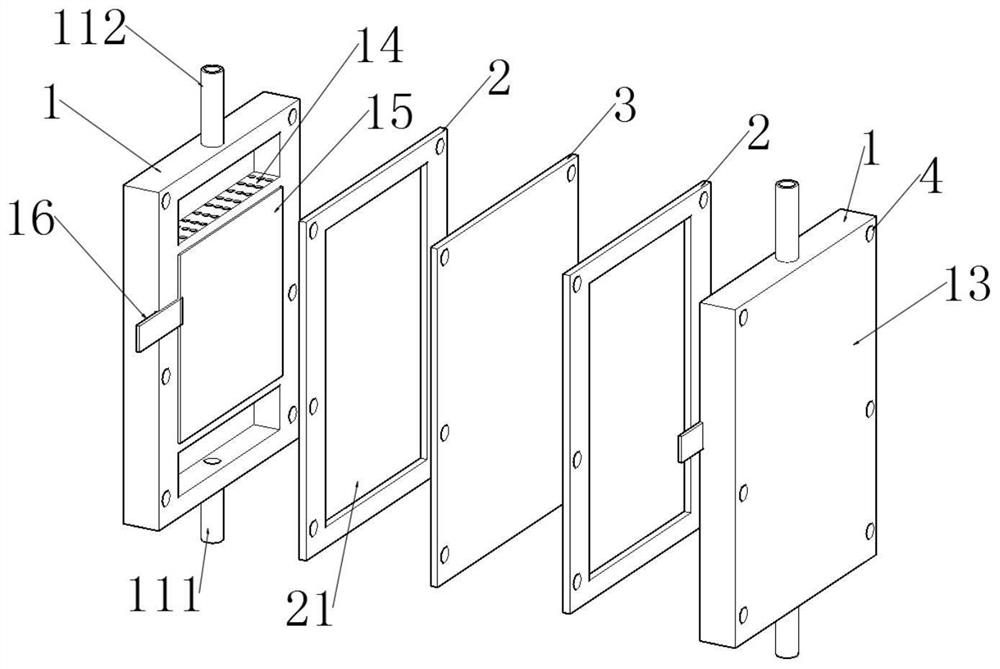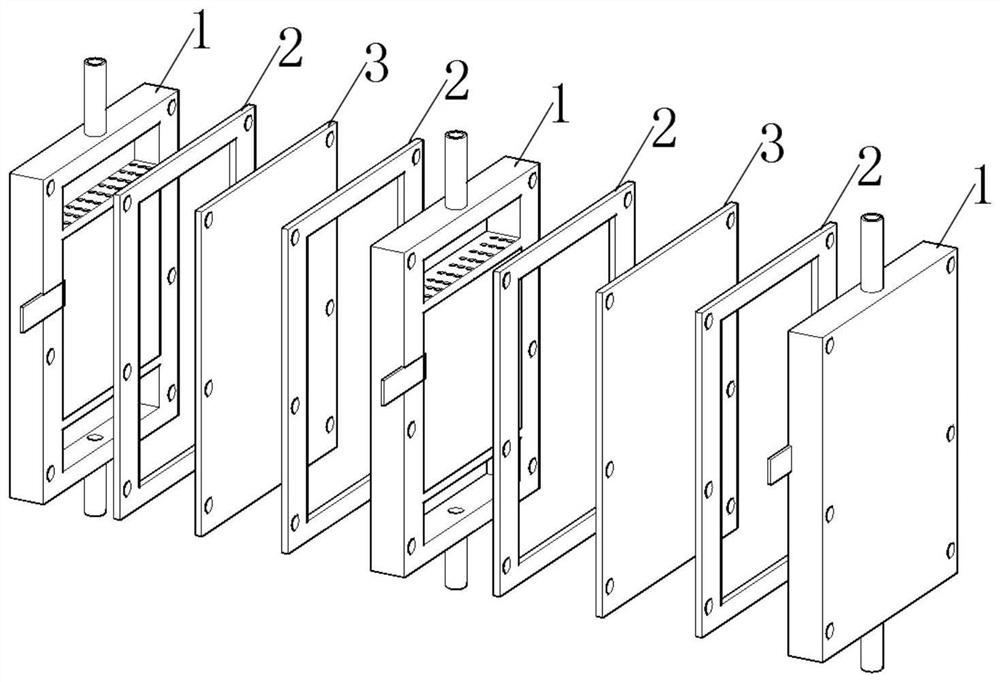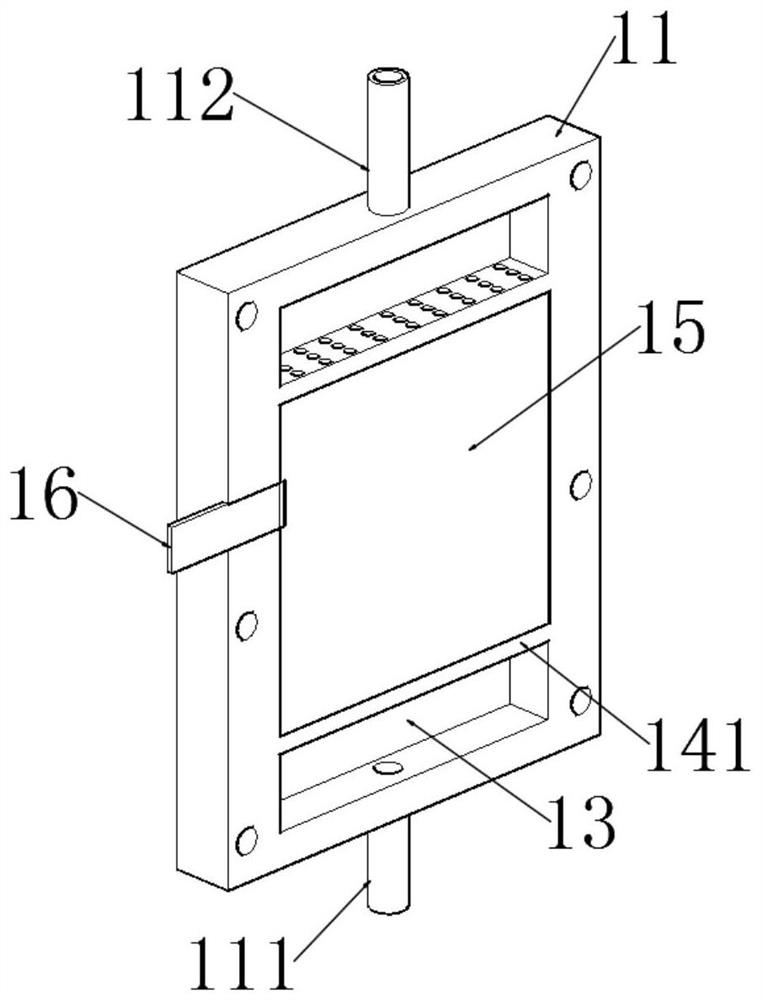A stacked three-dimensional rocking chair capacitive deionization device and deionization method
A capacitive deionization and stacking technology, applied in the field of water treatment, can solve the problems of small treatment capacity and low efficiency, and achieve the effect of large treatment capacity, expanding adsorption space, and realizing simple and controllable expansion.
- Summary
- Abstract
- Description
- Claims
- Application Information
AI Technical Summary
Problems solved by technology
Method used
Image
Examples
preparation example Construction
[0064] As a further illustration, in order to obtain an electrode material that can improve the adsorption performance of the capacitive deionization device, the preparation method of the material for the Ag@C three-dimensional electrode includes the steps:
[0065] S1, mix Aspergillus niger and water in a solid-liquid ratio of 1-5g:50ml to obtain Aspergillus niger solution;
[0066] S2, successively adding 1-3g m-phenylenediamine and 0.5-5g ammonium persulfate to the Aspergillus niger solution to react, and after the reaction for 1-8h, the suction molding is performed, and then the material obtained after the suction filtration is subjected to Freeze-drying to obtain polym-phenylenediamine@Aspergillus niger composite material;
[0067] S3, placing the poly-m-phenylenediamine@Aspergillus niger composite in 500-3000ppm AgNO 3 The solution is allowed to stand, and then drying treatment and carbonization treatment at 400-1000° C. are performed in sequence to obtain the material ...
Embodiment 1
[0082] Material preparation of Ag@C three-dimensional electrode: 3g of Aspergillus niger was placed in a 100mL beaker, 50mL of deionized water was added, 2g of m-phenylenediamine was added, and 2.202g of ammonium persulfate was added. After freeze-drying, the obtained polym-phenylenediamine@A. niger composites were placed in 2000ppm AgNO 3 The solution was left standing for 24 h, dried at 60 °C and then carbonized at 800 °C to obtain the material of Ag@C three-dimensional electrode.
[0083] The internal structure and element distribution of the prepared Ag@C three-dimensional electrode material can be referred to Figure 9 (converted from the color picture) to understand, it can be seen that its interior has a filamentous structure and has large voids for ion adsorption; in addition, the specific values of the element distribution of the Ag@C three-dimensional electrode material are as follows:
[0084]
[0085]
Embodiment 2
[0087] like figure 1 , image 3 , Figure 4 and Figure 7 As shown, a stacked three-dimensional rocking chair type capacitive deionization device includes a main body and accessories. The main body includes a chamber mechanism 1 , a cation exchange membrane 3 , a current collector 16 , and a silica gel gasket 2 .
[0088] The chamber mechanism 1 further includes two terminal chamber mechanisms located at both ends of the stacking direction. In addition, the above accessories are mainly fixed installation parts, including silicone tubes and screws.
[0089] A silicone gasket 2 is arranged on the right side of the left terminal chamber mechanism, a silicone gasket 2 is arranged on the left side of the right terminal chamber mechanism, and a commercial cation exchange membrane 3 is arranged between the two silicone gaskets 2; Among them, each terminal chamber mechanism, each silica gel gasket 2 and each cation exchange membrane 3 have the same size, and the outer edges are fl...
PUM
 Login to View More
Login to View More Abstract
Description
Claims
Application Information
 Login to View More
Login to View More - R&D
- Intellectual Property
- Life Sciences
- Materials
- Tech Scout
- Unparalleled Data Quality
- Higher Quality Content
- 60% Fewer Hallucinations
Browse by: Latest US Patents, China's latest patents, Technical Efficacy Thesaurus, Application Domain, Technology Topic, Popular Technical Reports.
© 2025 PatSnap. All rights reserved.Legal|Privacy policy|Modern Slavery Act Transparency Statement|Sitemap|About US| Contact US: help@patsnap.com



